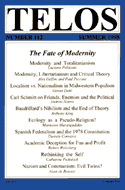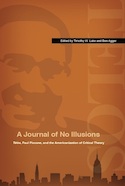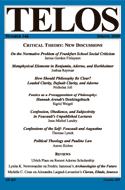By Frederik Stjernfelt · Monday, November 14, 2011 Telos Press looks forward to publishing Democratic Contradictions of Multiculturalism by Jens-Martin Erikson and Frederik Stjernfelt, scheduled to appear in March 2012.
It is with an increasing feeling of sickness that I follow the incidents around the Parisian weekly Charlie Hebdo and its special issue on sharia prompted by the political developments in Libya and Tunisia.
Early in the morning of November 2nd, a window was broken and a Molotov cocktail thrown into the premises of the weekly which burned out. By sheer luck, nobody was hurt. In the expectedly strong reactions against this attack on free speech, disturbing voices and events intervene. Initially, the asylum offered to the publishers by the daily Libération constituted an encouraging event—one voice supporting the other against threats to free speech.
Continue reading →
By Itai Farhi · Friday, November 4, 2011 As an occasional feature on TELOSscope, we highlight a past Telos article whose critical insights continue to illuminate our thinking and challenge our assumptions. Today, Itai Farhi looks at Anthony King’s “Baudrillard’s Nihilism and the End of Theory,” from Telos 112 (Summer 1998).
 The discipline of critical theory, originating in the work of the Frankfurt School, attempts to move from pure description of society toward a critique of society with the goal of bringing about change. In recent years, this discipline has itself been criticized. One of the leaders of this anti-critical theory crusade was Jean Baudrillard, whose intellectual legacy in relation to the state of modern theory Anthony King evaluates in his article “Baudrillard’s Nihilism and the End of Theory.” The discipline of critical theory, originating in the work of the Frankfurt School, attempts to move from pure description of society toward a critique of society with the goal of bringing about change. In recent years, this discipline has itself been criticized. One of the leaders of this anti-critical theory crusade was Jean Baudrillard, whose intellectual legacy in relation to the state of modern theory Anthony King evaluates in his article “Baudrillard’s Nihilism and the End of Theory.”
Continue reading →
By Maxwell Woods · Monday, October 31, 2011 A Journal of No Illusions: Telos, Paul Piccone, and the Americanization of Critical Theory is now available from Telos Press. Maxwell Woods talked with contributor Scott McNall about the influence of Telos and Paul Piccone on his intellectual outlook.
Maxwell Woods: Your article “The Good, the Bad and the Ugly: A Retrospective on Telos” discussed Telos‘s development, from its beginnings in 1968 to its publicizing of Carl Schmitt, federalism, and populism. How did this article, and Telos more generally, fit into your intellectual world when you wrote the piece?
 Scott McNall: When I wrote the piece, I was focused on the collapse of the economy, climate change, and the continued destruction of the biosphere on which human life depends. I wondered what it would be like if the Telos “gang” were all together again, what they would make of our current situation. I’m sure it would be more than just “We told you so.” I very much wished I could have found out from Paul Piccone what he thought about our current economic and biological crises, not because I would necessarily have agreed with him, but because I would have almost certainly been forced to deal with new ways of thinking about the problems. In writing the piece I also needed to go back over years of the journal; it was a treat and an opportunity to remember the debates, the good ideas, those that were not so useful, and the emotion and intellectual energy that fueled the entire Telos project. Scott McNall: When I wrote the piece, I was focused on the collapse of the economy, climate change, and the continued destruction of the biosphere on which human life depends. I wondered what it would be like if the Telos “gang” were all together again, what they would make of our current situation. I’m sure it would be more than just “We told you so.” I very much wished I could have found out from Paul Piccone what he thought about our current economic and biological crises, not because I would necessarily have agreed with him, but because I would have almost certainly been forced to deal with new ways of thinking about the problems. In writing the piece I also needed to go back over years of the journal; it was a treat and an opportunity to remember the debates, the good ideas, those that were not so useful, and the emotion and intellectual energy that fueled the entire Telos project.
Continue reading →
By Maxwell Woods · Monday, October 24, 2011 A Journal of No Illusions: Telos, Paul Piccone, and the Americanization of Critical Theory is now available from Telos Press. Maxwell Woods talked with contributor Robert D’Amico about his history with Telos and the journal’s influence on his intellectual outlook.
Maxwell Woods: How did your article “What is Federalism? On Piccone’s Late Political Philosophy” fit into your own intellectual outlook?
 Robert D’Amico: I have always been interested in political philosophy in the widest sense of that term. Telos was born out of a focus on Marx and Marxism as political theories within European philosophy. Like the journal, I abandoned that framework in time, before the journal did I think, but it did me a lot of good to think through those issues and the journal made some of the more interesting work on it available. The focus on federalism and populism came late in Paul’s life. I can’t say that they are part of my thinking, but writing this piece gave me an opportunity to work through what Paul and I often talked about in the times I saw him in NYC before his death. Also I think that is what Paul would have liked, not a remembrance of him but an argument. Robert D’Amico: I have always been interested in political philosophy in the widest sense of that term. Telos was born out of a focus on Marx and Marxism as political theories within European philosophy. Like the journal, I abandoned that framework in time, before the journal did I think, but it did me a lot of good to think through those issues and the journal made some of the more interesting work on it available. The focus on federalism and populism came late in Paul’s life. I can’t say that they are part of my thinking, but writing this piece gave me an opportunity to work through what Paul and I often talked about in the times I saw him in NYC before his death. Also I think that is what Paul would have liked, not a remembrance of him but an argument.
Continue reading →
By Maxwell Woods · Monday, October 17, 2011 A Journal of No Illusions: Telos, Paul Piccone, and the Americanization of Critical Theory is now available from Telos Press. Maxwell Woods talked with contributor Robert Antonio about the influence of Paul Piccone and Telos on his intellectual development.
Maxwell Woods: In your article “Absolutizing Particularity,” you discuss Telos and Paul Piccone’s critique of liberalism. How do you view this article today? How did this piece fit into your intellectual world when you wrote it?
 Robert Antonio: Every or nearly every participant at Telos and, probably, most of its serious readers have had serious objections, fears, or dissatisfaction with liberalism as we have known it from the start. However, there have always been different liberalisms, and, as Paul stressed, divergent positions toward them among the Telos circle and readership. When I started reading the journal, “social liberalism” (Keynsianism and the welfare state) was the dominant capitalist regime, but already riven with contradictions and in decay. Many of us split with the journal when “market liberalism,” or neoliberalism, was in ascendance and took different positions toward it. I rejected the Schmittian and populist turn and return to tradition and had more affirmative views about key facets of liberal political and legal institutions, civil society, and social liberalism. However, I don’t believe that liberalism and capitalism as we have known them are sustainable. We have a huge environmental wall ahead and fundamental problems with capitalism’s growth imperative, and we also face multiple deep crises related to finance, real economy joblessness, and inequality. I have always disagreed with Paul’s exhaustion thesis about the liberal-left, but I fear that the consequent crises are upon us and the political culture is not responding; there is a profound lack of political vision and political will. We are in trouble, but not in exactly the way that Paul expected. The crisis and future of liberalism and capitalism is for me the most central issue for social theory and politics today. Thus, I try to follow divergent views about this issue. Robert Antonio: Every or nearly every participant at Telos and, probably, most of its serious readers have had serious objections, fears, or dissatisfaction with liberalism as we have known it from the start. However, there have always been different liberalisms, and, as Paul stressed, divergent positions toward them among the Telos circle and readership. When I started reading the journal, “social liberalism” (Keynsianism and the welfare state) was the dominant capitalist regime, but already riven with contradictions and in decay. Many of us split with the journal when “market liberalism,” or neoliberalism, was in ascendance and took different positions toward it. I rejected the Schmittian and populist turn and return to tradition and had more affirmative views about key facets of liberal political and legal institutions, civil society, and social liberalism. However, I don’t believe that liberalism and capitalism as we have known them are sustainable. We have a huge environmental wall ahead and fundamental problems with capitalism’s growth imperative, and we also face multiple deep crises related to finance, real economy joblessness, and inequality. I have always disagreed with Paul’s exhaustion thesis about the liberal-left, but I fear that the consequent crises are upon us and the political culture is not responding; there is a profound lack of political vision and political will. We are in trouble, but not in exactly the way that Paul expected. The crisis and future of liberalism and capitalism is for me the most central issue for social theory and politics today. Thus, I try to follow divergent views about this issue.
Continue reading →
By Charles Kollmer · Monday, August 8, 2011 As an occasional feature on TELOSscope, we highlight a past Telos article whose critical insights continue to illuminate our thinking and challenge our assumptions. Today, Charles Kollmer looks at Nicholas Joll’s “How Should Philosophy Be Clear? Loaded Clarity, Default Clarity, and Adorno,” from Telos 146 (Spring 2009).
 In an apropos piece of metaphilosophy entitled “How Should Philosophy Be Clear?” Nicholas Joll offers several insights on the concept of clarity in relation to philosophical texts. On initial inspection, Joll’s style seems to reveal a bias towards the Analytical tradition in philosophy: his argumentation is clearly organized, rigorous, and formulated in logical propositions. Yet his work also attains the savvy and self-awareness that renders metaphilosophy convincing, as demonstrated in his first proposition, which states that any notion of clarity will be partisan with regards to the Analytical-Continental divide. In spite of this partisanship, Joll champions a concept of “default clarity” and demonstrates its aptitude for judiciously evaluating argumentation. He shrewdly refuses to overdetermine the prescriptive force of default clarity. Far from an immutable law, default clarity offers broad guidelines with the caveat that “the justificatory burden lies with those who would eschew such clarity.” In an apropos piece of metaphilosophy entitled “How Should Philosophy Be Clear?” Nicholas Joll offers several insights on the concept of clarity in relation to philosophical texts. On initial inspection, Joll’s style seems to reveal a bias towards the Analytical tradition in philosophy: his argumentation is clearly organized, rigorous, and formulated in logical propositions. Yet his work also attains the savvy and self-awareness that renders metaphilosophy convincing, as demonstrated in his first proposition, which states that any notion of clarity will be partisan with regards to the Analytical-Continental divide. In spite of this partisanship, Joll champions a concept of “default clarity” and demonstrates its aptitude for judiciously evaluating argumentation. He shrewdly refuses to overdetermine the prescriptive force of default clarity. Far from an immutable law, default clarity offers broad guidelines with the caveat that “the justificatory burden lies with those who would eschew such clarity.”
Continue reading →
|
|
 The discipline of critical theory, originating in the work of the Frankfurt School, attempts to move from pure description of society toward a critique of society with the goal of bringing about change. In recent years, this discipline has itself been criticized. One of the leaders of this anti-critical theory crusade was Jean Baudrillard, whose intellectual legacy in relation to the state of modern theory Anthony King evaluates in his article “Baudrillard’s Nihilism and the End of Theory.”
The discipline of critical theory, originating in the work of the Frankfurt School, attempts to move from pure description of society toward a critique of society with the goal of bringing about change. In recent years, this discipline has itself been criticized. One of the leaders of this anti-critical theory crusade was Jean Baudrillard, whose intellectual legacy in relation to the state of modern theory Anthony King evaluates in his article “Baudrillard’s Nihilism and the End of Theory.”  Scott McNall: When I wrote the piece, I was focused on the collapse of the economy, climate change, and the continued destruction of the biosphere on which human life depends. I wondered what it would be like if the Telos “gang” were all together again, what they would make of our current situation. I’m sure it would be more than just “We told you so.” I very much wished I could have found out from Paul Piccone what he thought about our current economic and biological crises, not because I would necessarily have agreed with him, but because I would have almost certainly been forced to deal with new ways of thinking about the problems. In writing the piece I also needed to go back over years of the journal; it was a treat and an opportunity to remember the debates, the good ideas, those that were not so useful, and the emotion and intellectual energy that fueled the entire Telos project.
Scott McNall: When I wrote the piece, I was focused on the collapse of the economy, climate change, and the continued destruction of the biosphere on which human life depends. I wondered what it would be like if the Telos “gang” were all together again, what they would make of our current situation. I’m sure it would be more than just “We told you so.” I very much wished I could have found out from Paul Piccone what he thought about our current economic and biological crises, not because I would necessarily have agreed with him, but because I would have almost certainly been forced to deal with new ways of thinking about the problems. In writing the piece I also needed to go back over years of the journal; it was a treat and an opportunity to remember the debates, the good ideas, those that were not so useful, and the emotion and intellectual energy that fueled the entire Telos project.  In an apropos piece of metaphilosophy entitled “How Should Philosophy Be Clear?” Nicholas Joll offers several insights on the concept of clarity in relation to philosophical texts. On initial inspection, Joll’s style seems to reveal a bias towards the Analytical tradition in philosophy: his argumentation is clearly organized, rigorous, and formulated in logical propositions. Yet his work also attains the savvy and self-awareness that renders metaphilosophy convincing, as demonstrated in his first proposition, which states that any notion of clarity will be partisan with regards to the Analytical-Continental divide. In spite of this partisanship, Joll champions a concept of “default clarity” and demonstrates its aptitude for judiciously evaluating argumentation. He shrewdly refuses to overdetermine the prescriptive force of default clarity. Far from an immutable law, default clarity offers broad guidelines with the caveat that “the justificatory burden lies with those who would eschew such clarity.”
In an apropos piece of metaphilosophy entitled “How Should Philosophy Be Clear?” Nicholas Joll offers several insights on the concept of clarity in relation to philosophical texts. On initial inspection, Joll’s style seems to reveal a bias towards the Analytical tradition in philosophy: his argumentation is clearly organized, rigorous, and formulated in logical propositions. Yet his work also attains the savvy and self-awareness that renders metaphilosophy convincing, as demonstrated in his first proposition, which states that any notion of clarity will be partisan with regards to the Analytical-Continental divide. In spite of this partisanship, Joll champions a concept of “default clarity” and demonstrates its aptitude for judiciously evaluating argumentation. He shrewdly refuses to overdetermine the prescriptive force of default clarity. Far from an immutable law, default clarity offers broad guidelines with the caveat that “the justificatory burden lies with those who would eschew such clarity.” 

